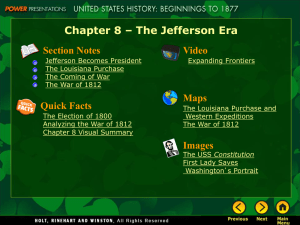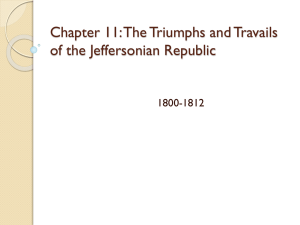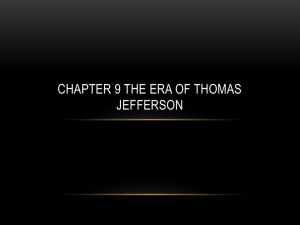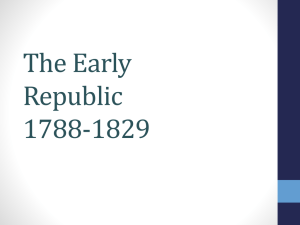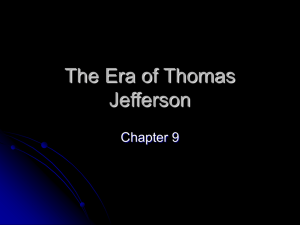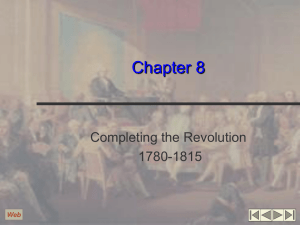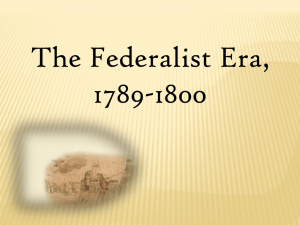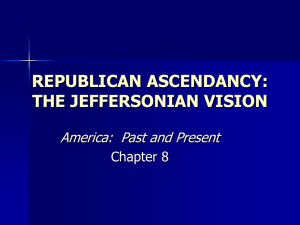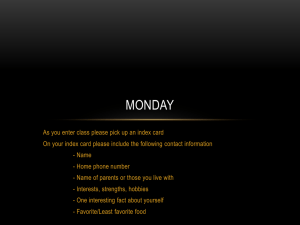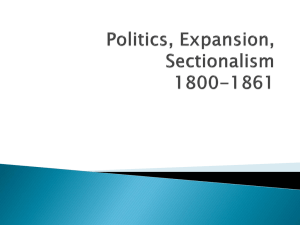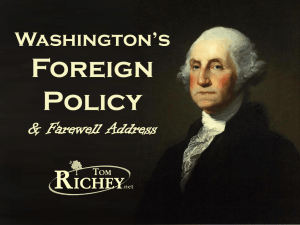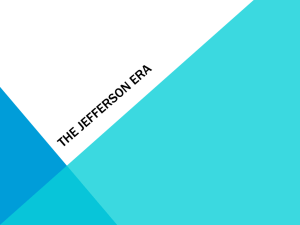Chapter 9 The Era of Thomas Jefferson (1800 * 1815)
advertisement
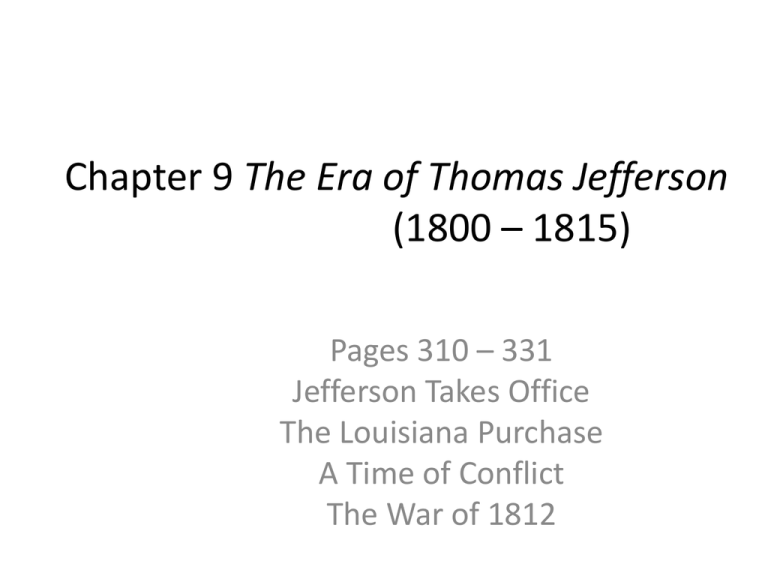
Chapter 9 The Era of Thomas Jefferson (1800 – 1815) Pages 310 – 331 Jefferson Takes Office The Louisiana Purchase A Time of Conflict The War of 1812 New Republican Policies • Jefferson fired tax collectors, and some diplomats and backed up his laissez faire ideas. • Furthermore he reduced the army and cut it’s budget in half. • He released those imprisoned under the Sedition Acts and refunded them their fines. He thought these acts violated the Constitutional rights of people to have freedom of speech and the press from the First Amendment. Federalist Polices Remain • Jefferson could not get rid of all federalists ideas like repaying the national debt. • He let federalists officials in government keep their jobs if they did them well and were loyal citizens. Question The Sedition Act punished people who openly criticized the government. When Jefferson took office , A. He founded a newspaper to publish information about the executive branch B. He signed a bill authorizing special privileges to newspaper journalists C. He released people who had been imprisoned under the Sedition Act D. He supported the passage of a “freedom of the press bill” The Supreme Court and Judicial Review • Jefferson did not let one federalists keep his job, Judge William Marbury who was appointed to the courts by Adams just before his term ended. • Marbury sued Jefferson and the case went to the Supreme Court. Marbury claimed that the Judiciary Act of 1789 gave him the right to keep his post. • The Supreme Court led by Chief Justice John Marshall ruled against Marbury in a case that became known as Marbury vs. Madison who was Secretary of State and the one who had to fire him. • This led to the Supreme Courts ability to rule laws as being unconstitutional which is known as Judicial Review. Question Which of the following is an example of Judicial Review A. The Supreme Court rules that a new law violates the Constitution B. Congress agrees to appoint a Supreme Court Justice C. A newspaper article criticizes a Supreme Court decision D. A decision by a lower court is appealed to a higher court Section 2 The Louisiana Purchase • Jefferson limited the power of government but he had a great interest in the Western lands. The Nation Looks West • There were a million settlers from the Appalachian Mountains to the Mississippi by 1800. • Most were farmers and sent their goods down the Mississippi River to the port of New Orleans to sell to the rest of the world. • Spain controlled the lower part of the river and had a deal with us to let us sail through to do this trading. • Jefferson learned that Spain had secretly given the Louisiana Territory back to France and he feared Napoleon’s power to want to conquer other lands. • Would the westward expansion of the country be blocked by this military dictator? Buying Louisiana • Even before this transfer took place Spain stopped the shipping of American goods in 1802 and the western settlers exploded with anger. • Many in the U.S. wanted Jefferson to declare war to get back their rights to use the major southern port of New Orleans. Question The Mississippi River was especially important to farmers because it A. Blocked the westward expansion of the U.S. B. Was a barrier protecting them from Native American attacks C. Encouraged new settlers to come north on barges and steamboats D. Allowed them to ship their crops to market in New Orleans A Surprise Offer • Jefferson thought it better to try and buy New Orleans and part of Florida. He sent James Monroe and Robert Livingston to try and work a deal. • The French colony of Haiti at that time declared their independence and France lost a foothold to defend these western lands. • England was threatening to go to war with France and Napoleon needed money to support his army in this fight. He offered not only New Orleans but all the Louisiana Territory! • Since it would take months to talk to Jefferson the two agreed to buy these lands for 15 million dollars or 4 cents an acre! These lands almost doubled the size of our country. • Although it was mostly unexplored and wilderness Jefferson believed it would become good fertile lands for future settlers. • The size of our country would allow us to become a future power in the world and people like Robert Livingston saw this. Jefferson’s Dilemma • Jefferson realized that the constitution said nothing about President’s having the power to buy lands. • He however had the right to sign treaties and approached it that way and the Senate quickly voted to buy the Louisiana Territory. Question Thomas Jefferson was uneasy about purchasing the Louisiana Purchase because A. He worried the land would be of poor quality B. He did not trust Monroe and Livingston to make a fair deal with the French C. He did not have the constitutional power to buy the land from another country D. He worried he would anger farmers who shipped their crops to New Orleans. Question From which foreign nation did the United States purchase the Louisiana Purchase from A. Spain B. Britain C. Haiti D. France Lewis and Clark Explore the West • • • • In January of 1803, even before the deal was officially done, Jefferson asked Congress to come up with 2,500 dollars to fund an expedition or a long and organized journey. Jefferson picked Meriwether Lewis to be the Captain of the trip and Lewis picked William Clark to be his co leader. Their assignment was to report back on the geography, plants, animals, and other natural features of the region. Jefferson also wanted to see if they could find a water route from the Mississippi to the Pacific Ocean. Into the Unknown • In the spring of 1804 The Corps of Discovery headed into the unknown. Leaving St. Louis and heading up the Missouri River. • They had about 40 men and supplies spread out amongst their 3 boats. There were several French Canadians and one slave named York. • In early August they met native Americans for the first time and 3 weeks later they were at the eastern edge of the Great Plains. • By October of 1804 they reached an area controlled by the Mandan people and spent their first winter there. Sacagawea (wife of a French Canadian Guide) • While staying with the Mandan Lewis and Clark meet a French Guide and his wife Sacagawea. • She is a Shoshone Indian who would become their translator. Crossing the Rockies • In April of 1895 they set out for the West and by summer they were starting to climb the Rocky Mountains. • They came across some Shoshone Indians and Sacagawea recognized the Chief to be her brother. With her help the Shoshone agreed to sell the expedition horses they needed to cross the Mountains. • Lewis had hoped to see a huge river to cross the Mts. but all he saw was a long massive set of high mountain peaks. They needed these horses badly. At the Pacific • On the other side of the Rockies they came to the Columbia River and made canoes to travel up river. • In an early morning November fog they finally saw the Pacific Ocean. • They stayed the winter of 1805 – 1806 on the coast where the Columbia meets the Pacific Ocean. • That March they headed home and it took 6 months to make it back to St. Louis and boy did they have stories to tell about a cool area known as the West. Question Which of the following was not a result of the Lewis and Clark expedition A. Information about plant and animal life in the west B. A reluctance to explore more of the Louisiana Territory C. Increased knowledge of Native American cultures D. A map showing a new route to the Pacific Ocean Pike’s Expedition • • • While Lewis and Clark were discovering the Pacific Zebulon Pike took an expedition to explore the southwestern part of the Louisiana Territory. As he tried to climb a mountain that rose out of the plains in Colorado he found himself in snow up to his waist and had to turn back. This mountain has forever been known as Pike’s Peak. His return trip took him through Spanish New Mexico where he was captured by Spanish troops. Eventually his group was released months later and they shared the beauty of the area they had explored. This made Americans interested in the Southwest forever after. Read pages 322 – 331 and answer the following questions on a sheet of paper. Also answer the Check Your Progress questions 1- 5 on the same paper. • What was the point of Jefferson’s Embargo Act and what were the results for Americans? • Who was Tecumseh and the Prophet and what did each want for their people? • What were the two main reasons their were War Hawks in 1812? • What are impressments and how did they effect Americans? Section 3 A Time of Conflict (Jefferson Era) • Washington and Adams had troubles dealing with Britain and France. Neither wanted to take sides and Jefferson was no different. Defeating the Barbary States • Four small countries in North Africa began attacking American Ships after the Revolutionary War because we seemed weak and easy prey. • The Barbary States were taking goods and men from European and American ships unless they paid tribute – money paid by one country to another in return for protection. • Jefferson stopped the practice of paying tribute and sent war ships to the Mediterranean Sea to protect merchant ships. • After a war ship called the Philadelphia ran aground at the port city of Tripoli and the sailors imprisoned, Stephan Decatur led 300 men in a raid to burn the ship and were successful. • These men were known as Marines and that is where the line “from the shores of Tripoli” comes from in the Marine Anthem or song. • This inspired confidence in the American Army and the new nation. • American Neutrality is Challenged By 1803 Britain and France were at war again. This gave American companies opportunities to make money. • Yet, both French and British war ships attacked American trading ships at sea to stop the other from getting goods from us. • All in all over 1,500 ships were captured by these two countries from 1803 to 1807. • England was running low on sailors and turned to impressments which is capturing sailors at sea and claiming they were British whether they were or not just to get more men. • • • • Jefferson Responds with an Embargo Trying to avoid war with either country, Jefferson decided not to let Americans trade with Britain or France. This is called an embargo. This did not go well since American businesses lost millions. Jefferson was not looked upon very well by these wealthy men who were losing money every day. New Englanders were the most angered since that area depended on trade with Britain. So they turned to smuggling products across the Atlantic. In 1809 Congress repealed the Embargo Act just before Jefferson left office. It passed a less severe act which allowed American companies to trade with countries other than England and France. It also stated that when these two countries start to treat our ships with more respect Americans could begin to trade with the two great powers again. Tecumseh and the Prophet • In 1803 Ohio became a state and settlers kept moving farther west into the Indiana territory and beyond. This destroyed Native American hunting grounds and gave them diseases they had no protection from. New Leaders Take Charge • The Shawnee were hit hard by these developments. After 1805 two brothers began urging Native American resistance. Their names were Tecumseh and the Prophet. • While Tecumseh organized tribes to unite against the whites his brother urged them to return to their traditional ways of the past. Harrison’s Victory • The Governor of Indiana, William Henry Harrison, decided to take matters into his own hands and attack the native Americans along the Tippecanoe River. • This was a major victory and the power of Tecumseh’s league went down but he and his braves still continued to fight for years. Question Which of the following became famous for winning the Battle of Tippecanoe A. Tecumseh B. The Prophet C. Oliver Hazard Perry D. William Henry Harrison Section 4 War of 1812 Our first 3 presidents did their best to avoid war with Britain and France. Our 4th president will not be so fortunate. The Move Toward War • Tension with Britain grew worse in 1812 because Americans were mad that the British were supplying native Americans like Tecumseh with weapons. Furthermore impressments continued and got even worse with the British declaring they would not stop. • Congressmen like Henry Clay and John Calhoun wanted to declare war on Britain and became known as War Hawks. Early Days of the War • Britain was already at war with France but did not turn down the opportunity to attack the U.S. • Jefferson had weakened the Navy and Army and neither was ready for war even though Americans had a great sense of nationalism or a great feeling of patriotism for their country. • Britain set up a blockade around major U.S. ports with 135 war ships and plenty of men. • Americans won a major sea battle when the U.S. Constitution beat the Guerriere in a fierce sea battle. Artillery fire bounced off the sides of the American ship and the sailors nicknamed her “ Old Ironsides” since her thick wooden sides seemed like iron. The War in the West and the South In the west both sides fought for control of the Great Lakes and both had allies with Native Americans. Invasion of Canada • Americans thought that Canada would welcome independence from British rule. We sent 2,000 men under General Hull into Canada but Hull was unsure of his own abilities and retreated. • A British army followed him and captured the entire army and this was a big loss in 1812. • The American fleet did better on the Great Lakes at Put-in-bay where after a 3 hour battle the American Navy won control of Lake Erie which forced the British army to retreat back into Canada. Oliver Hazard Perry • We have met the enemy and they are ours. • As the British retreated an American force under William Henry Harrison chased them and won a battle called Thames where Tecumseh was killed. Conflict in the South • Native Americans in the south lost as well when Andrew Jackson defeated the Creeks at the Battle of Horseshoe Bend and they gave over most of their lands to the whites in 1814. Final Battles The British finally defeated Napoleon in 1814 and were able to send many more troops to America. The British Attack Washington and Baltimore • Now the British strategy became to capture the capital of Washington D.C. and came very close to reaching their goal. • In August of 1814 the British marched into our capital and burned down many government buildings and then headed to Baltimore. • Just before the British got to the Capital Building Dolly the wife of James Madison had the servants gather important papers and paintings for future generations or posterity. • Baltimore was defended by Fort McHenry and the British had to attack it. On the night of September 13th 1814 the British War Ships bombed the fort all night. • Francis Scott Key was an American lawyer being held on a British ship watched the battle through the night. • When the fort still waved the American Flag the next morning it was nearly a miracle and he wrote a poem about it which became our national anthem, The Star Spangled Banner. I still get goose bumps, seriously. Question Which of the following wrote a poem that became our National Anthem? A. William Henry Harrison B. James Madison C. Francis Scott Key D. Oliver Hazard Perry The War Ends • By 1814 Britain had grown tired of war and decided to sit down with some or our diplomats in Ghent, Belgium and work out a treaty. • On Christmas Eve the Treaty of Ghent was signed but news took weeks to travel back to the States. • The two sides fought one more battle that was really unnecessary at New Orleans. It was a stunning victory for the Americans and Andrew Jackson of Tennessee led the mix of Americans of many backgrounds against the bulldog British. Protests and Peace • New Englanders in particular hated the war since they did most of there trading with Britain. • They called it Mr. Madison’s war after the blockade ruined their businesses even more. • A group of northern Federalists met in Hartford Connecticut in December of 1814. Some delegates suggested they secede from the Union which means leave to make their own country. • When news of the peace treaty arrived the convention broke up and the threat was over. • Some felt this was our second war for independence and felt great pride in their country and it’s achievement of victory against Britain again. Question for the Quiz 4 Point Question Describe the two main causes for the War of 1812 and two important results after the Peace Treaty of Ghent was signed. 2 Point Question To what extent were the Alien and Sedition Acts a violation of the democratic principals of the American Revolution? Read pages 349 – 367 and answer the following questions on a sheet of paper. 1.What were nominating conventions and why were they better than having a caucus choose the presidential candidates? 2.In 1827 the Cherokee claimed status as a separate nation from the U.S. What did they do to believe they could do this? 3.Why could a person say that President Jackson’s Indian Removal Act of 1830 was unconstitutional? 4.What do I mean when I say, “Sequoyah was interested in the talking leaves?” 5.Why would the idea of nullification weaken the Federal or Central Government? 6.What caused Jackson to put federal troops on alert in South Carolina in December of 1832?
